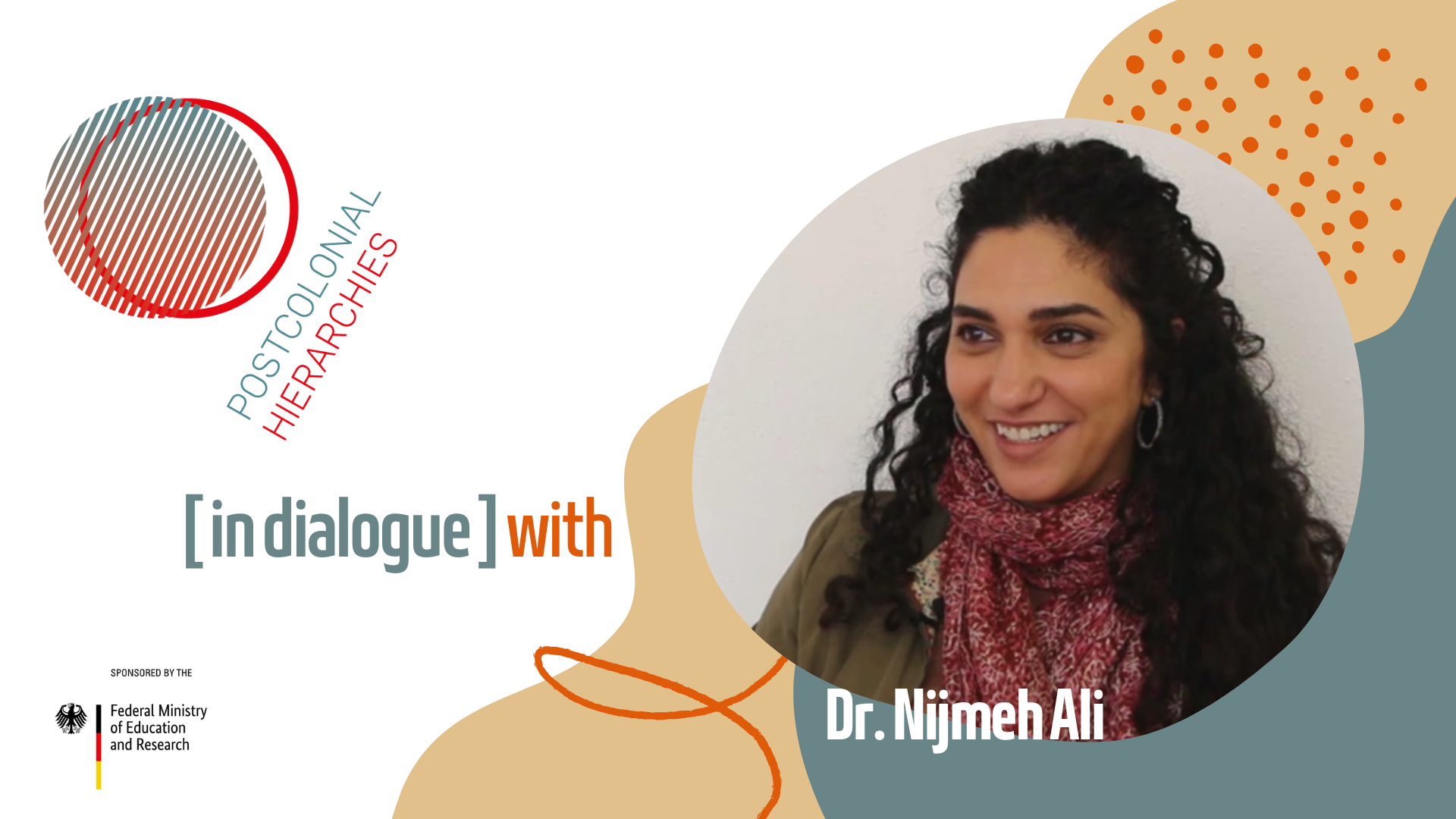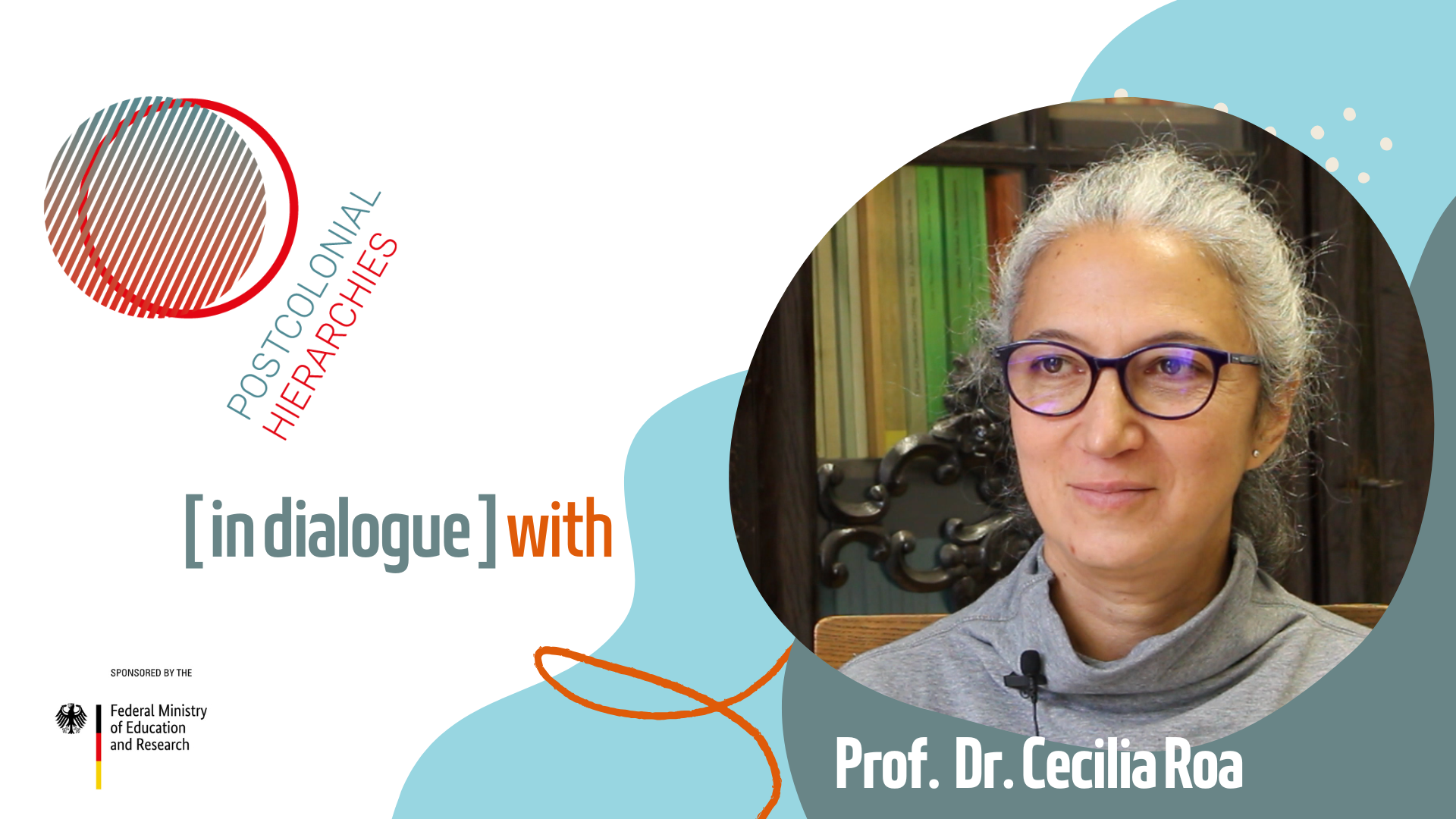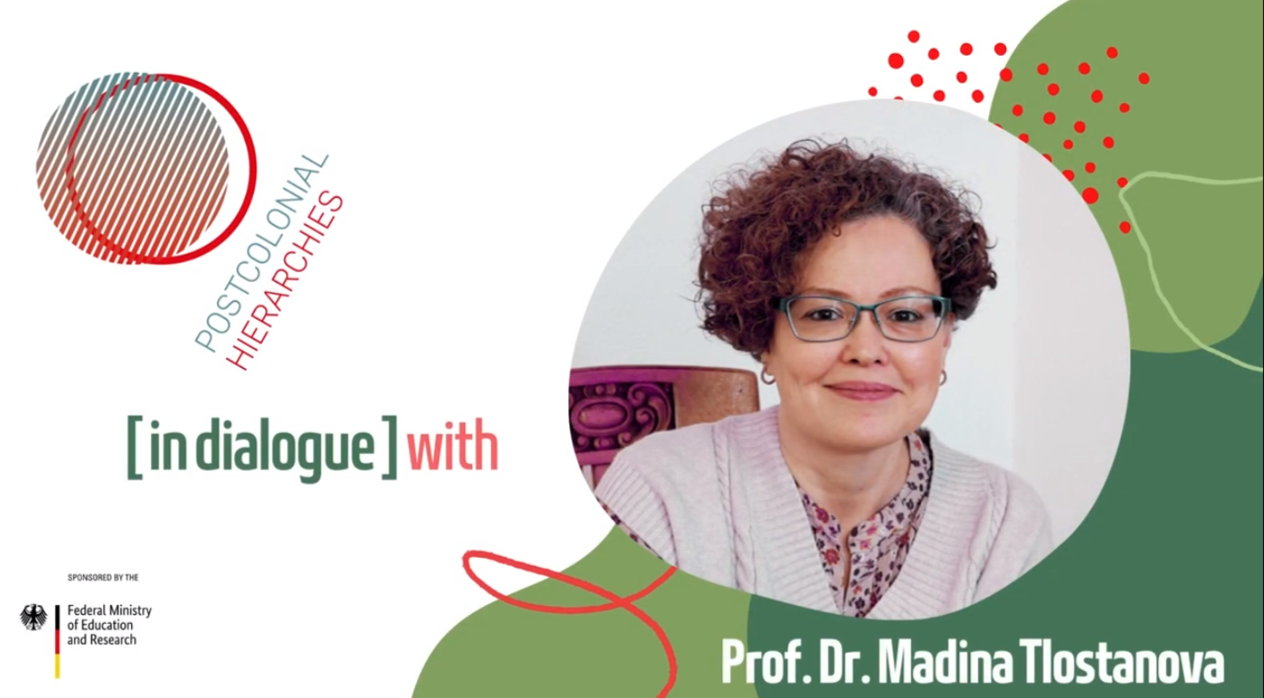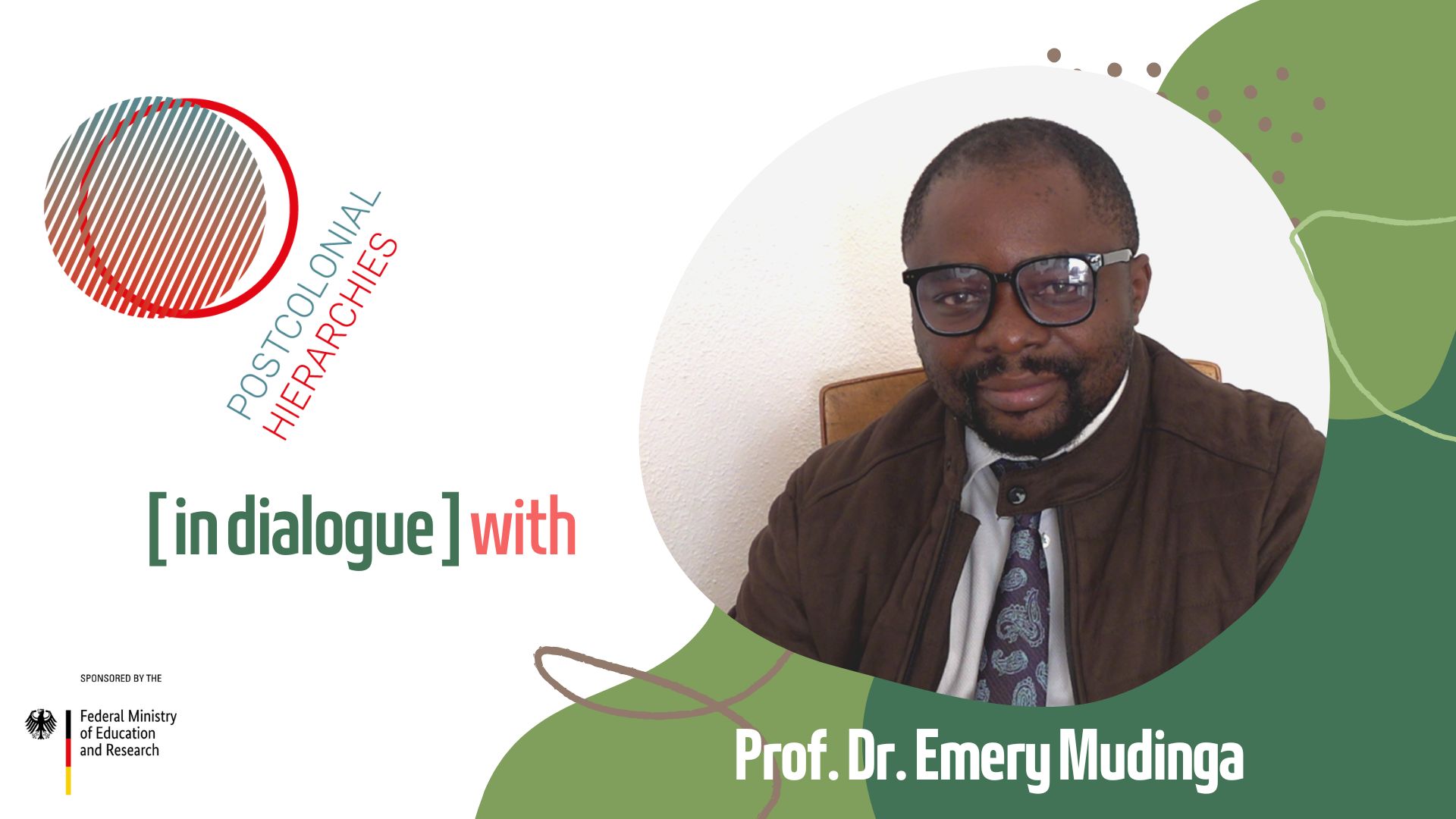In this video series, the network Postcolonial Hierarchies engages in a series of dialogues with experts working on (de)colonial and postcolonial approaches to peace and conflict. Our dialogues problematize issues of knowledge production pertaining to the study of violence, peacebuilding, critical security, memory and transformative justice in postcolonial settings. One of the main goals is to understand the epistemic hierarchies in which academic knowledge production is embedded, while opening up a space for a dialogic exchange between different epistemologies (forms and ways of knowing) both in and beyond academia.
[ In Dialogue ] With:
What does peace look like when viewed through a decolonial lens? How can resistance go beyond the armed and violent to encompass more profound and transformative forms of resistance? In this captivating interview, Nijmeh Ali shares insights from their personal and professional journey, offering a nuanced perspective on the dynamics of resistance and the concept of decolonial peace. Nijmeh Ali delves into why expanding the scope of resistance is essential in a field often narrowly focused on violent conflict, revealing the power of alternative forms of resistance that challenge oppression and colonial dynamics. From a decolonial understanding of peace, we explore its core components and why this perspective is vital for reimagining both the theory and practice of peacebuilding in different contexts. Throughout the discussion, Nijmeh Ali connects the dots between different forms of resistance and decolonial peace, sharing compelling examples from her empirical research
In this interview, we sit down with Cecilia Roa, a Colombian scholar specializing in environmental justice, to explore the intricate intersections of energy, water struggles, and environmental justice. Through the lens of participatory research, Cecilia delves into how these pressing issues shape our understanding of peacebuilding, conflict, and sustainable development. Cecilia sheds light on problems associated with so-called clean energy paradigms and the critical need to recognize the limits of developmentalism and advance issues of justice. In addition, she reflects on the necessity of collaborative and transdisciplinary research, sharing powerful anecdotes from her fieldwork with communities navigating the frontlines of socio-ecological challenges. Join us as we explore the untapped potential of integrating socio-ecological change into the broader discourse on peace, conflict, justice and sustainability.
Research on the laws of war in the 19th century has mainly focused on Europe and the US, often skipping from the 1815 Congress of Vienna to the 1864 Geneva Conventions. The period before 1864 is largely overlooked in the study of International Humanitarian Law (IHL). We spoke to Europe-based Mexican scholar Tania Atilano, who identified this historical gap as something that restricts contemporary understandings of concepts like ‘state sovereignty’ and ‘warfare.’
In this video, Tania talks about her ongoing research, which builds on her previous book titled ‘International Criminal Law in Mexico’, published with Asser Press, Springer.
In her new research project, Tania Atilano examines how the laws of war were applied in the context of the French Intervention in Mexico, which lasted from 1862 to 1867. In 1864, Maximilian, an Austrian archduke, was installed as Emperor of Mexico. This was part of France’s attempt to establish an annexed monarchy under Napoleon III. But the intervention attempt failed. Maximilian was captured. He was sentenced to death by a Mexican court, and then executed during the government of President Benito Juárez in 1867.
We asked Tania how she became interested in this topic, why this history matters to our current understanding of International Humanitarian Law, and how she goes about conducting her research.
To learn more:
Atilano, Tania Ixchel (2021): International Criminal Law in Mexico. National Legislation, State Practice and Effective Implementation. Asser Press/Springer. ISBN: 9789462654549, https://link.springer.com/book/10.1007/978-94-6265-455-6
Reseña del libro en español por Elisa Ortega Velázquez en International Journal of Constitutional Law, Volume 20, Issue 4, October 2022, Pages 1711–1713, https://doi.org/10.1093/icon/moac079 (acceso libre).
In this dialogue, Selbi Durdiyeva discusses her new book on how civil society engages with transitional justice in Russia. In it, she demonstrates a broad range of roles civil society can undertake while operating in a restrictive political context. Based on sociolegal research, the study focuses on three types of civil society groups dealing with the legacies of the Soviet repression in Russia – a prominent organisation that works on recovering historical truth, the International Memorial; a parish of the Orthodox Church of Russia operating at a former mass execution and mass burial site, the Church at Butovo; and contentious groups that could hinder attempts at reckoning and promote state narratives built on the Stalinist and WWII victory myths. This book explores an often-overlooked case of Russia’s transitional justice ‘from below.’ It provides insights into how even in authoritarian contexts, civil society can adopt imaginative, piecemeal, and at times unconventional ways of seeking justice outside and in the absence of official and institutionalised transitional justice measures. This book speaks to scholars of transitional justice, memory studies, human rights, and democratic and civil society theory, as well as policymakers and practitioners in these fields, and others with interests in Russian and post-Soviet studies.
To learn more:
Durdiyeva, S. (2023). The Role of Civil Society in Transitional Justice Processes: The Case of Russia. Routledge Transitional
Justice Series.
Durdiyeva, S. (2024). Towards Decolonial Agenda for Transitional Justice: „The Old is Dying and the New Cannot Be Born.“ In
Thamil Ventham Ananthavinayagan and Amritha Vishwanath Shenoy (eds.), The Wretched of the Global South: Critical Approaches to International Human Rights Law. Springer Singapore.
Durdiyeva, S., “Not in Our Name:” Why Russia is Not a Decolonial Ally or the Dark Side of Civilizational Communism and
Imperialism. 29 May 2023. John Hopkins School of Advanced International Studies (SAIS) Review of International Affairs.
Durdiyeva, S., April 2023 Blog: ‘The Virus of Truth’ – Protests and Documentation as an Impetus for Transitional Justice in
Belarus. Oxford Belarus Observatory.
Durdiyeva S. Transitional Justice. A Call for Decolonisation. 10 January 2023. FriEnt.
Alke Jenss provides an overview of her recent book „Selective Security in the War on DrugsThe Coloniality of State Power in Colombia and Mexico.“ Her work interweaves and expands debates on authoritarian neoliberalism and the coloniality of state power. In doing so, it provides a unique theoretical perspective to study state security practices in the context of the so-called war on drugs in Latin America.
~~~~~~~
To learn more:
Jenss, Alke (2023): Selective Security in the War on Drugs: The Coloniality of State Power in Colombia and Mexico. Rowman & Littlefield.
Podcast (en español) „Fuera de la caja“ CIEP-UCR: Seguridad selectiva y la guerra contra las drogas en México y Colombia.
Blogpost (in english): Selective Security: The Coloniality of State Power in Colombia and Mexico. Progress in Political Economy (PPP).
Karina Bidaseca, reconocida intelectual y artivista feminista y decolonial argentina, reflexiona en este video sobre el rol que tiene el artivismo en los procesos de cambio social „desde la calle“ y dentro de las instituciones académicas.
Con generosa precisión conceptual y profunda sensibilidad por el diálogo de saberes en el contexto Sur-Sur, Karina Bidaseca comparte sus experiencias y perspectivas como artivista y académica.
En diálogo con Miriam Bartelmann, del proyecto „Jerarquías Poscoloniales en Paz y Conflicto,“ Karina Bidaseca interpela las nociones dominantes del „saber científico“ y las posibilidades epistemológicas que abre el artivismo, para enfrentar y sobreponerse a los límites del pensamiento occidentalizado y así abrir nuevos horizontes para re-imaginar y transformar las prácticas de generación y difusión de conocimientos descolonizantes.
Para conocer más sobre Prof. Dr. Karina Bidaseca:
http://www.unsam.edu.ar/investigacion/investigador.asp?slug=Bidaseca-Karina
Prof. Dr. Madina Tlostanova, Professor of Postcolonial Feminisms at Linköping University in Sweden, reflects [in dialogue] with the network Postcolonial Hierarchies upon a broad and deep-ranging set of questions around (de)coloniality and peace & conflict studies:
- What is the difference between postcolonial and decolonial concepts?
- Why speak about hierarchies and not inequalities?
- How does power affect the consitution of social hierarchies?
- How does feminism understand and confront postcolonial hierarchies?
- And how can these perspectives contribute to advancing peace & conflict studies?
To learn more:
Tlostanova, M. (2015). Can the post-Soviet think? On coloniality of knowledge, external imperial and double colonial difference. Intersections 1(2), pp. 38-58. https://doi.org/10.17356/ieejsp.v1i2.38
Vlachou, M., & Tlostanova, M. (2022). The geopolitics of international higher education prior and during Covid-19: a decolonial feminist analysis. Globalisation, Societies and Education, 1–18. https://doi.org/10.1080/14767724.2022
And more: https://liu.se/en/employee/madtl83
Cette vidéo présente Prof. Dr. Emery Mudinga, Directeur de l’Institut Angaza au sein de l’Institut Supérieur de Développement Rural (ISDR) de Bukavu en République Démocratique du Congo.
Emery Mudinga est aussi membre fondateur des Bukavu Series (https://bukavuseries.com/), une exposition en ligne qui met en évidence les dynamiques de pouvoir entre les chercheurs du Nord et du Sud. Le Silent Voices Blog est une prolongation visuelle des Bukavu Series qui analyse comment les connaissances académiques sont produites et quelles implications éthiques apparaissent lors de la recherche dans les régions en conflit.
Reconnu en tant qu’académique sur la scène internationale, en tant que conseiller et militant, Prof. Dr. Emery Mudinga réfléchit – en dialogue avec le réseau des Hiérarchies Postcoloniales – à comment une approche décoloniale pourrait faire progresser le domaine des études de paix et de conflit.
~~~~~~~~
Pour en apprendre plus sur les travaux de Prof. Dr. Emery Mudinga:
Vlassenroot, K., Mudinga, E., & Musamba, J. (2021). Navigating Social Spaces: Armed Mobilization and Circular Return in Eastern DR Congo. Journal of Refugee Studies, 33(4), 832–852. https://doi.org/10.1093/jrs/feaa048
Nyenyezi Bisoka, A., an Ansoms, Vlassenroot, K., Muzalia, G., & Mudinga, E. (Eds.). (2019). La Série Bukavu: Vers une décolonisation de la recherche. Presses universitaires de Louvain. https://bukavuseries.com/book/
Nyenyezi Bisoka, A., an Ansoms, Vlassenroot, K., Muzalia, G., & Mudinga, E. (2021) “Power dynamics with researchers on the ground needs a reset”, The Conversation, 12 January 2021, https://theconversation.com/power-dynamics-with-researchers-on-the-ground-needs-a-reset-124673








